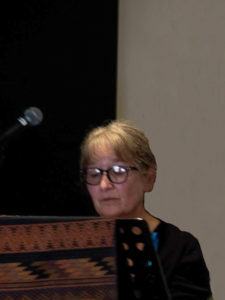Cheryl Ashley
British Columbia Winner, 2018 VCBF Haiku Invitational

in a dark cupboard
full of coats
cherry blossom petals
Cheryl Ashley
Nanaimo, British Columbia
Congratulations on having your haiku selected as the top winner in the British Columbia category in the Vancouver Cherry Blossom Festival’s 2018 Haiku Invitational contest. How did you first learn about haiku, and how much writing of haiku or other poetry have you done?
The first haiku I ever read was on a Vancouver bus. It was Winona Baker’s haiku:
moss hung trees
a deer moves into
the hunters silence
At the time I was writing longer poems and stories, and hoping for a column somewhere. I was also deeply into photography. When I read her haiku, it seemed to be much like a photograph, a moment captured in time, in a very minimalistic way. I had to learn how to do this and have been studying haiku and writing them ever since. That was more than thirty years ago. And I write one each day. Though many are pedestrian, one occasionally flies off the page.
What was the inspiration for your winning poem?
Having lost two very special men last fall, I was thinking of them both one day and wondering if I would ever feel lightness again. This was the inspiration for the haiku.
Describe the moment when you first learned you had won.
Oh, I was thrilled to hear the news, and was happy to share this with my close friends and family. It had been a long day, and I was so tired when I got home, and to read this, wow—energy level shot right up.
Do you have favourite books or websites relating to haiku that others might benefit from in order to learn haiku as a literary art and to share one’s haiku?
I really love Winona Baker’s books. Clouds Empty Themselves is the one I most often read. Found Haiku in English: The First Hundred Years is a wonderful book on modern haiku, and the introduction by Billy Collins is illuminating.
Please tell us more about yourself.
Writing, art, and music take precedence, plus cats, hiking, gardening, and photography. And I read every day—novels, poems, newspapers when I can get them, and historical fiction. I have a BA (English major) and have many years of post-graduate work in English literature and fine arts. I have one son and am retired from the public sector.
How does where you live and what you enjoy doing affect the way you write haiku?
I have been living on a small island in the Salish Sea for the last 21 years. When the cat and I go for our walks I try and notice details big and small, something with which to write the daily haiku.
